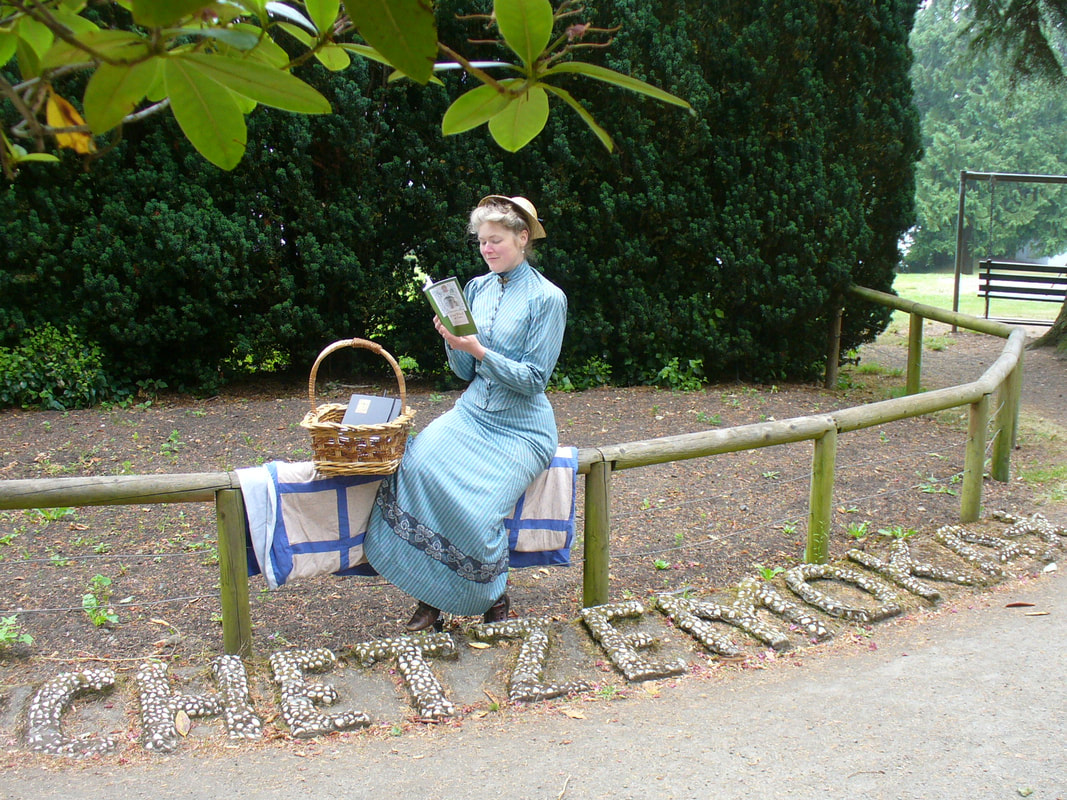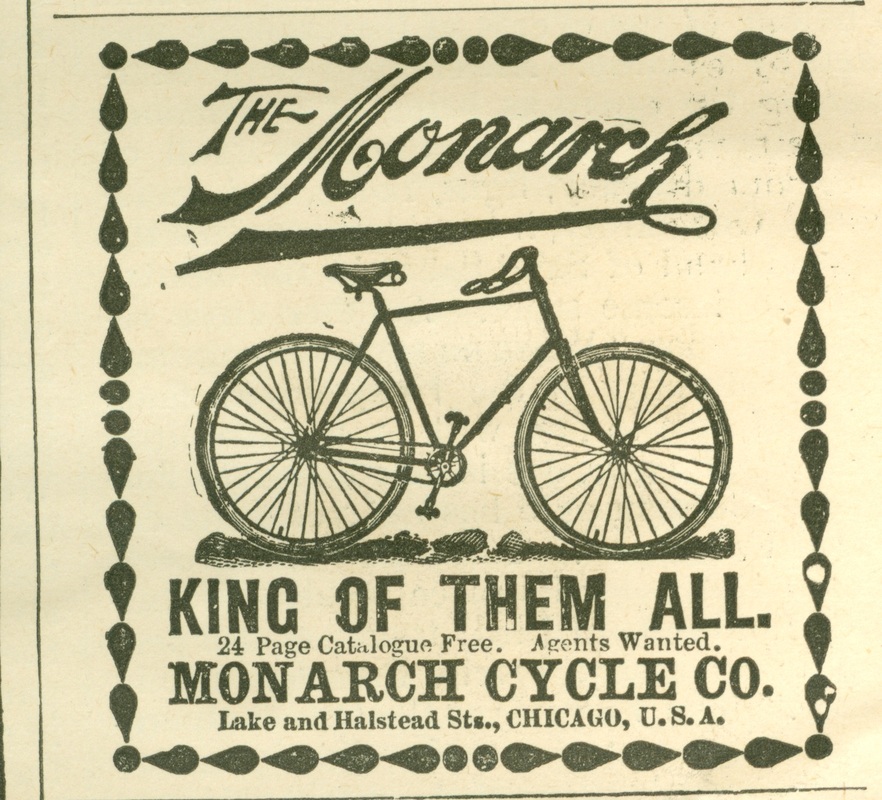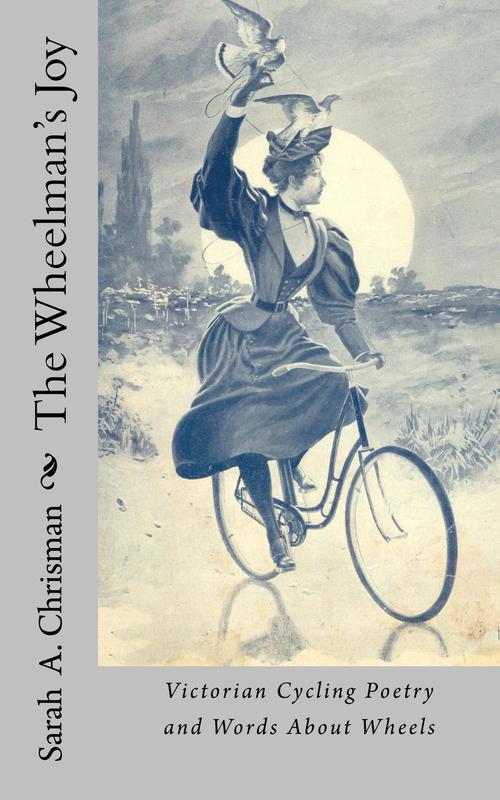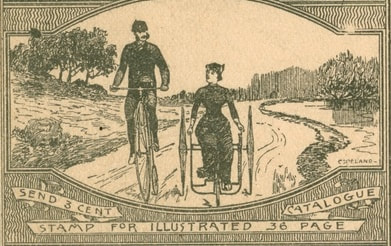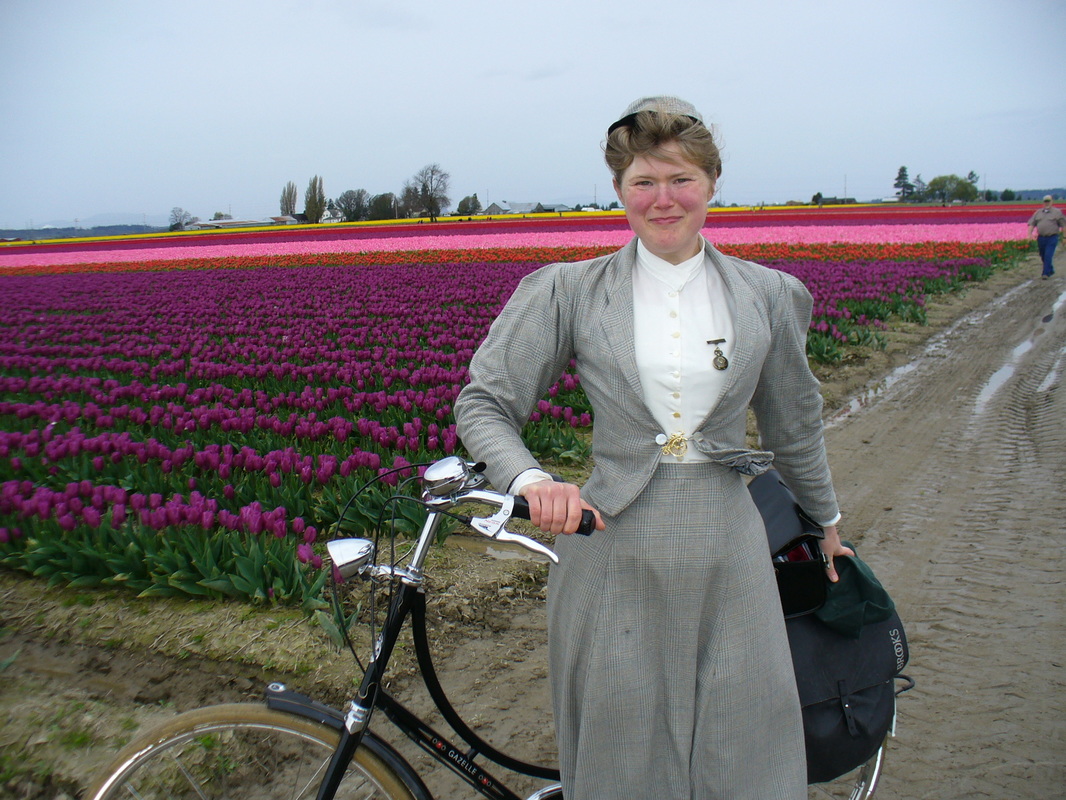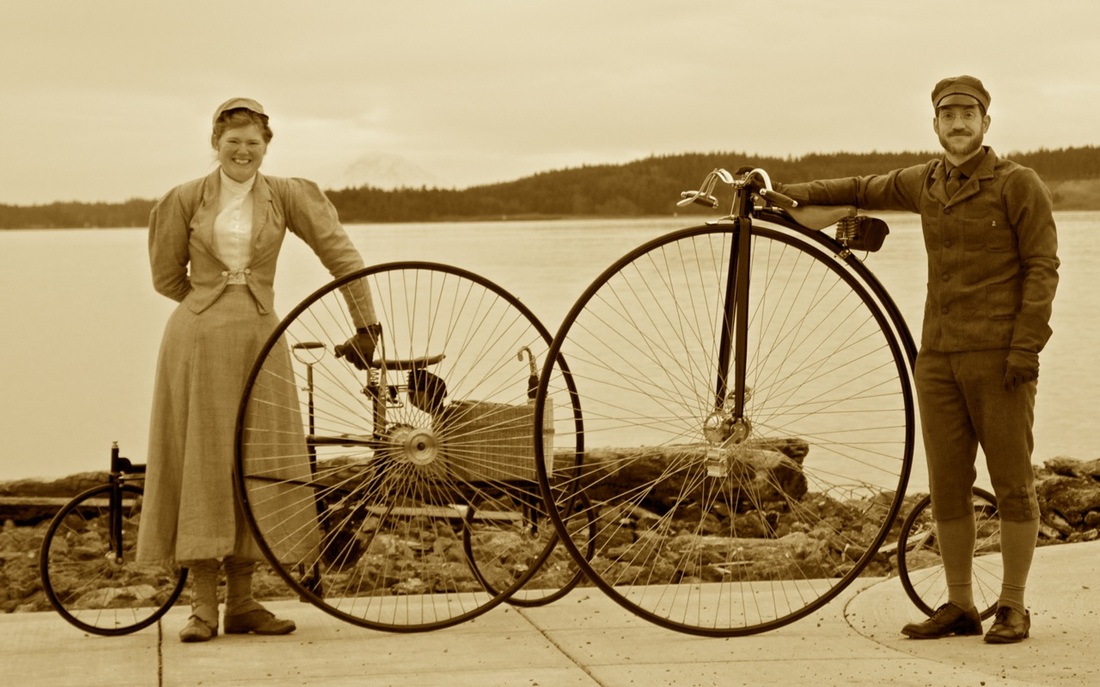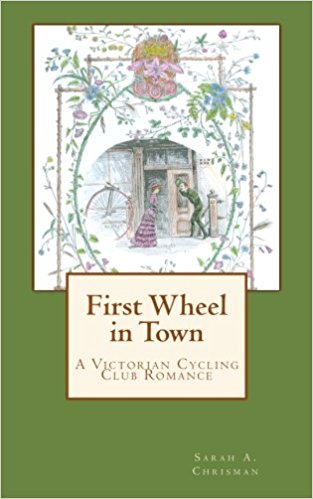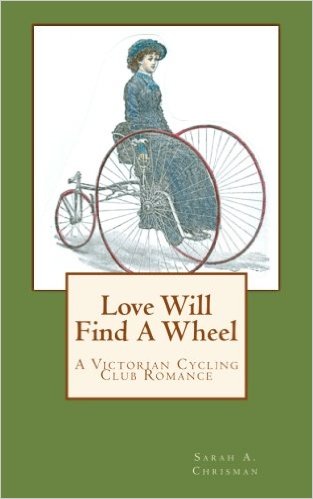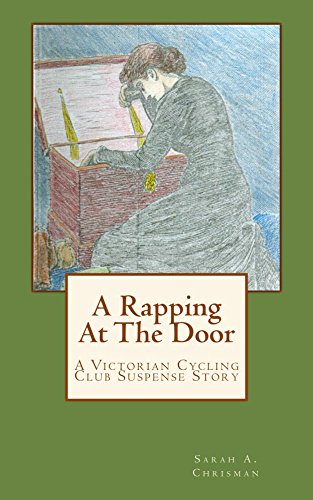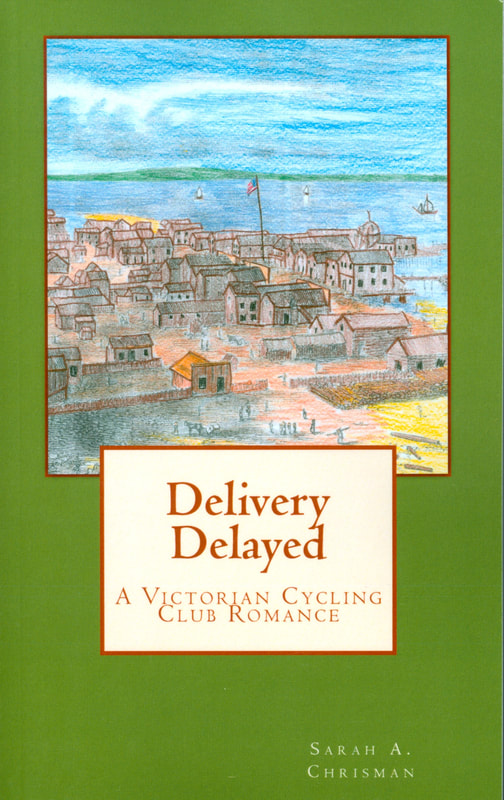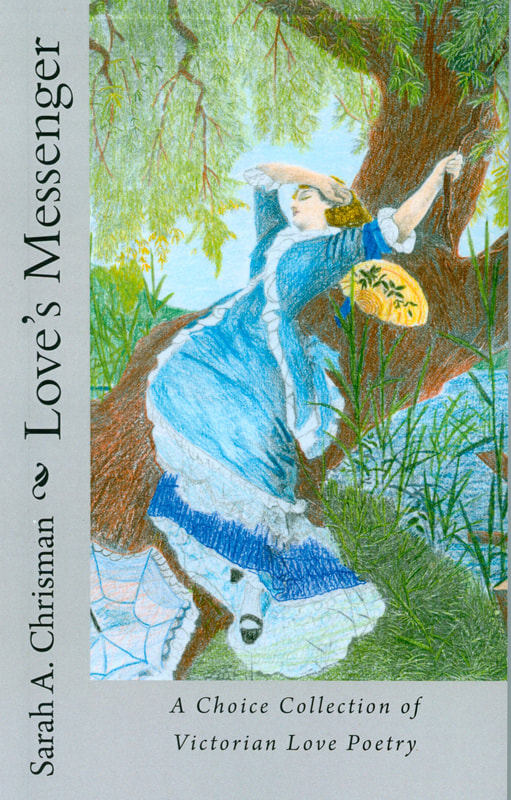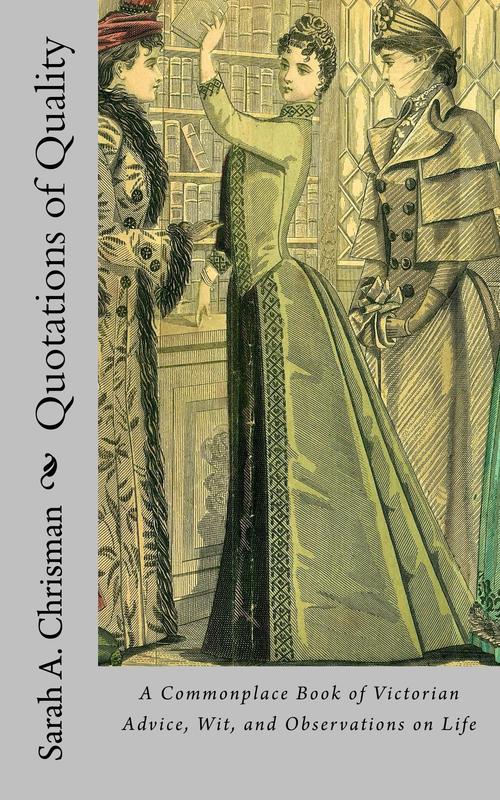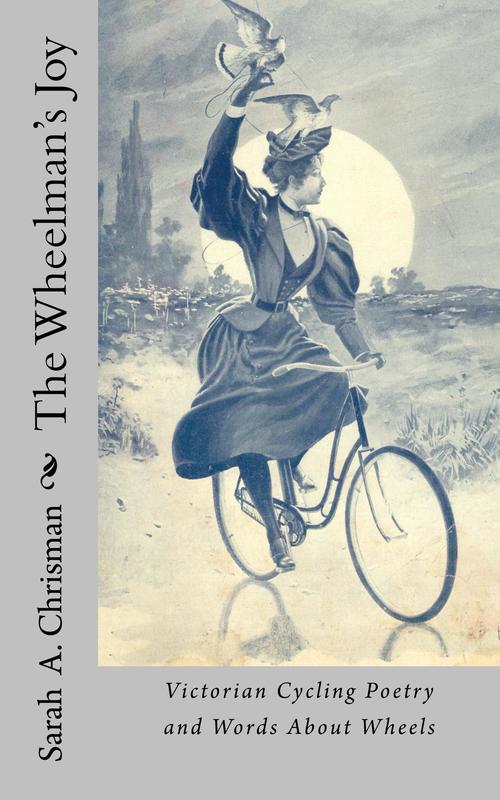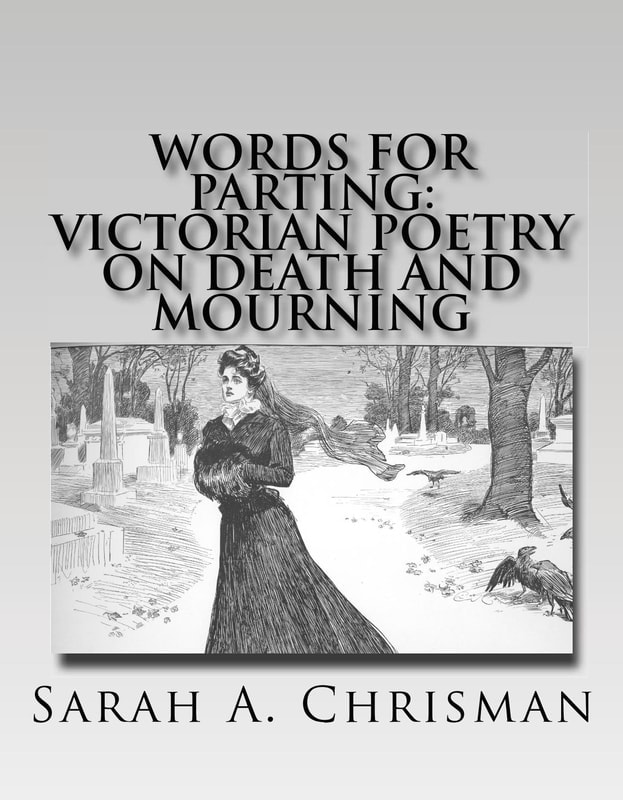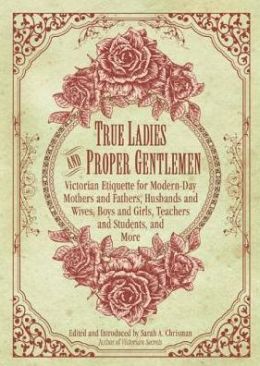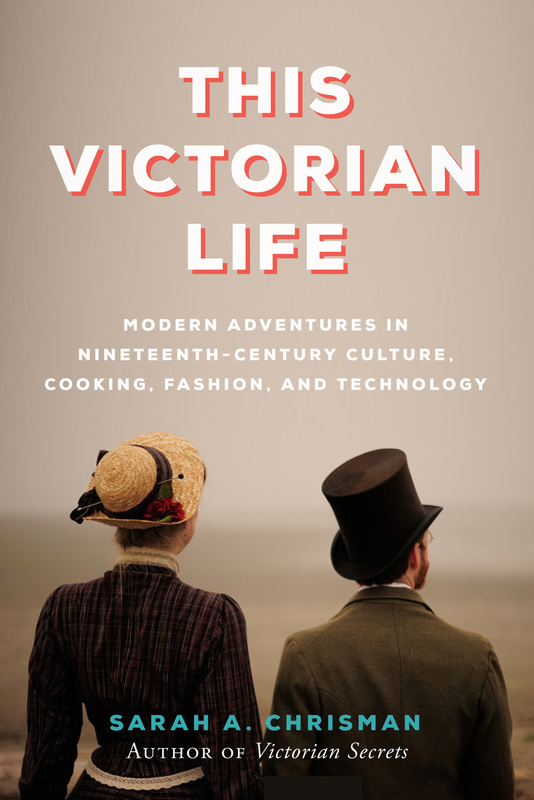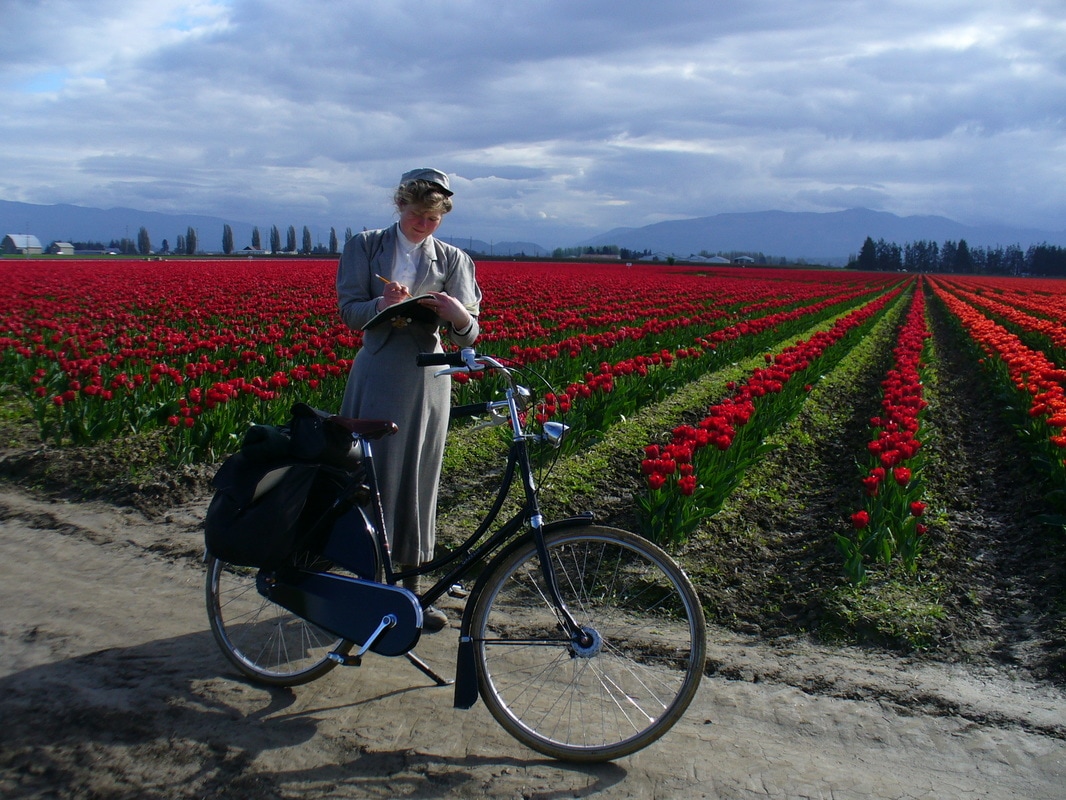Historic Article
A Burglar, A Bicycle,
And A Storm
By Cleveland Moffett
Godey's Magazine, April 1896, pp. 379—385.
(Fiction)
(Note by the author: - The following remarkable confession was found among the papers of a brilliant Western lawyer, recently deceased. It is unnecessary to state by what chance it came into my hands, this much only being important, that I have carefully screened the identity of a man who was universally respected and loved. His purpose in making this revelation of himself will be sufficiently served by publishing the facts, without giving names and places.)
Never shall I forget, or cease to bless, that night of the great storm, when I turned from despair to crime and, worn out with the struggle of living, lifted my hand against my neighbor. It was poverty that drove me to it, and utter hopelessness, and a dull rage against conditions. I was just turned thirty, and for three years had heard the old lawyers of B-- City speak of me as one of the brightest young men at the bar of the State. Bah! what did it all amount to, my brilliant studies at Harvard, the prizes and honors I had won, the bright promise before me! I could not earn the wages of one of the rough laborers who shovelled on the railroad; I could not buy the books I needed, nor pay my office rent. My clothes were shabby. I had gone for days without sufficient food.
I was bitter, I was desperate, I was too proud to beg. And so I turned to crime, Curious, how that could happen to a young man who from childhood had been pointed out as a model, indefatigable in work, earnest of purpose, high in ideal. I think it was the very strength of my character that made it possible, and the knowledge that my misfortunes were so undeserved. Had I been conscious of any neglect or weakness on my own part, I might have borne the load meekly and kept back my fierce rebellion. As it was, I struck down all barriers - social, moral, artificial.
Since the people among whom I had striven were pitiless to me, I would show them no pity; since they would not help me, I would help myself. I rushed away the old distinction between right and wrong as an empty myth. I was better than these people who ignored me, stronger than they in mind, of more importance to the world - so why should I starve? Thus I reasoned.
To carry out my purpose, once conceived, seemed easy. The work of an ordinary loutish house-breaker must be child's play to a man of my intelligence. I would plan the act so as to achieve fortune at a single stroke, with no chance of detection. For one night in my life I would be a thief, a burglar, with the full approval of conscience. Never again would I resort to the ways of stealth, but while in them I would make it worth my while.
I was not long in finding my chance. Two miles and a half out from the city lived a rich man who had employed me once to draw up some papers. I knew that, in his desk, badly guarded, were stocks and bonds and money, of which one half would lift my burden, and leave him more than he could ever need. So much of his possessions I resolved to make my own.
The rich man's house stood on the slope of a lonely valley through which a creek flowed into the B-- River. This creek had originally been a small river itself, but its waters had been dammed some three miles back to form a reservoir for the city. It was near this reservoir, in a poor little suburb dwelt in mostly by workingmen, that I had been obliged to make my home. Every morning I had been accustomed to ride into the city, five miles distant, on a bicycle which was to me a relic of better days. Now it saved me car-fare. Every night I rode back again, over the same five miles, and on each trip I passed the rich man's house, which served to keep him in my mind. I also passed over a heavy old bridge, which crossed the creek and carried both railway trains and ordinary road traffic. So often had I ridden over this ground that I knew every stone and turn in it by heart; I could almost have made it blindfold. All this topography is clear, I trust, as it has to do with my story; - The reservoir, near which I lived, five miles to the north of the city; then, midway between the reservoir and the city, the rich man's house in the valley of the creek, and just beyond that the old bridge across which the railroad led straight into B-- City, while the road went there in a curve.
I chose a dark night for my attempt, a night when the rain was already falling and worse weather threatening. It had been raining, indeed, for days, and the river was swollen. At supper the workmen had told how the reservoir roads were in frightful condition, but I did not mind that; constant practice had made my muscles strong.
I went to my room early, giving it out that my head was paining me. Then as soon as the house was quiet I dropped to the ground from my window, which was up only one flight, took my wheel from a shed where I kept it, and started down the road. Before I had gone a hundred yards, I was drenched to the skin.
I carried with me only a single tool, to assist me in my work. This was a long, heavy chisel which would give me powerful leverage for opening both window and desk. I had no fear of interference, for the noise of the storm would cover any slight disturbance I might make, and the rich man's household contained few people - only himself, an aged sister, and two servants. I knew, furthermore, that they all slept in rooms apart from the library where was the desk I wished to plunder. Half an hour would be all I needed.
It was out eleven o'clock when I reached the house, and the night was awful. The rain fell in torrents, while dazzling flashes lighted up the valley at intervals in the darkness and showed the stretch of treetops dashed together in the fury of the gale. From the distance there sounded a steady rumbling, a sort of suppressed roar, quite different from the fierce claps of thunder. So far from disturbing me, this outburst of nature seemed to harmonize with my own stern mood. We were both bent on work of violence.
The rich man's house was silent, all were sleeping, and I entered without difficulty. I made my way to the library and, chisel in hand, I stood before the desk. I laughed quietly to think what a fool this man was, to leave a fortune so easily within my reach. I proceeded leisurely, looking about the room whose shadows caused me no dismay, pausing in my work now and then to admire some picture or work of art that hung on the walls. I, too, should have money now, I thought!
Suddenly a crash came, a long tearing, rending sound, not of thunder nor the shivering of a tree; not any phenomenon of the storm, but something I felt to be more full of menace; something I did not understand. I stood still and listened as the sound died away, seeming to merge itself into the long roar I had previously noticed, a roar which now grew in volume. I thought of the reservoir, and what the workmen had said at supper. I peered out of the window, but could see nothing through the utter blackness of the night. Then I heard footsteps stirring in the rooms above, and voices. The household was alarmed, there came upon the stairs the tread of a man's foot, and I saw myself on the point of being taken.
Quickly the instinct of fear possessed me, and making my way to the window where I had entered, I leaped out into the storm. Mindless of my purpose, and thinking only of safety now, I seized my wheel, sprang into the saddle, and pushed on down the road to the city, taking that direction by some instinct, I know not what, that seemed to guide me.
As I cast a look backward I saw lights moving about in different parts of the house, and one shining from the windows of the library. At the same instant it came upon me that I had dropped the chisel in my fright, and that the partially forced door of the desk and the open window must betray me. Perhaps I had made some noise in escaping. I strained my ears and heard a call from the house and an answering voice from the direction of the stables. Could it be possible there was any purpose of pursuit? I could scarcely believe it, and yet, even as I wondered, I heard the sound of wheels behind me, and saw a lantern flashing. Then I heard an excited voice cry out, "Faster, for God's sake, faster!" while I caught the sound of the lash on a horse's back.
In an agony of fear I gripped my handle-bars and pressed on through the mud, the rain and wind holding me back. Just ahead was a slight rise in the road, after which came a straight descent to the stone bridge. I felt that if I could but reach this height before my pursuers I should be safe. But they were gaining on me rapidly; I could hear them plainly now urging on the horse to greater exertion.
The bridge was built on heavy stone piers, the whole structure being so strong and compact that it carried the railroad tracks overhead with a carriage road underneath, and a walk on either side for foot-passengers. As I started down the slope with the galloping horse almost upon me, the wall of masonry which formed the railroad approach to the bridge rose sheer at my right and gave some brief protection from the storm. Already my wheel was going faster, and I pressed the pedals desperately, leaning forward to give extra force to every stroke, straining every muscle as I had never done in a college race, although I had been a famous athlete in my time. The bridge lay before me now not more than a hundred yards distant, but the horse was scarcely ten yards behind. And now he seemed to run as if the storm fiends were pursuing him. the men shouted louder, and presently the shots of a revolver rang out as they came plunging on. The mud here was next to impassable, and heavy stones washed into the road blocked my way. Do what I would, I was losing ground, I felt it, although I dared not turn in my saddle and look back. Should I be able to reach the level floor of the bridge before they were on me? I knew that a bullet might strike me at any moment. I thought of prison and disgrace.
How I ever got there I do not know, or how my wheel resisted the violence of that descent. As I struck the firm level of the bridge the head of that snorting, maddened horse was just beside me. I felt on my neck flecks of foam, and the hot breathing from his wide-spread nostrils. It was a close shave, but I felt that I was safe for the moment. No horse living could keep pace with me over those hard, smooth boards. How the tunnel of the bridge rumbled with the strokes of the horse's hoofs and the lurching of the wheels! There was not thought now of the fine for rapid driving. They were driving like mad men, and I think for the time we were all mad - the men, and the horse, and I.
It is only in moments of great crisis like this one that one understands how swift are the processes of thought and the impressions made upon the brain. As drowning men are said to do, so I saw the years of my life pass in quick succession. I saw how I had tried and failed; I realized that the odds were now all against me; these men had been near enough to recognize me, doubtless, and even if I managed to distance them for the moment my capture would be only a matter of time. And capture meant conviction, ruin. If I had had a weapon with me I should have killed myself there and then. As it was, I rode on, and took a certain dull pleasure that I was gaining. Now five yards separated us, now ten yards. I was half-way across the bridge.
Suddenly a flash of lightning broke through the darkness,and revealed a great black chasm yawning before me. So quickened were my faculties that I understood the situation in an instant - the reservoir had burst, changing the shallow creek into a raging cataract, and the resistless force of the torrent had wrecked the central pier of the bridge. There it lay crumbled before me, while the black waters seethed and boiled around the fallen buttress. The main part of the central span was gone, and there was left only a remnant of the foot-path supported on two iron girders that had stretched from pier to pier at one side. It was about thirty feet long and not more than three feet in width, with here and there a displaced plank. Below it was certain death, beyond it might be safety.
There was no conscious deliberation. I did not pause to weigh my chances as between the dangers in front and the danger behind; I did not even slacken my speed or attempt to use the brake; I simply turned my wheel upon that narrow strip, and thanks to one long flare of lightning, dashed across as steadily as if I were riding on a country path. As I started I heard the horse snort and plunge as they dragged him up on his haunches, while one of the men called out: "The bridge is down! He'll be killed!"
Then the other man shouted after me, "Stop the express!"
Those last words struck me like a bullet, and had I not been nearly across I am sure I should have fallen. Up to that moment I had been calmly indifferent to my own fate, but now I remembered with a thrill of horror that the express running out of B-- City was due about this time and was doomed to frightful destruction, unless I could save it. Like a rush of warm blood through the limbs of a frozen man came the thought that I might do some good after all, and atone for my crime by at least one worthy deed.
How I rode after that! If fear had given me strength and nerve, then the desire to rescue gave me wings.
A moment more and I reached the end of the bridge. Again the wall of masonry that supported the railroad rose beside me. Again the storm beat into my face and a road swimming with mud lay before me, sloping upward. To mount that little hill was the hardest bit of riding I ever did in my life. I thought I should never get there, and even as I reached the top I heard the shrill whistle of the express at the distant grade crossing. I knew that in three minutes it would be on me. In three minutes and ten seconds a hundred people would be dashed to their deaths unless I could do something. Those are the times when a man's thoughts go fast. But fast or slow, my thinking would have availed little but for a box of fuses I had made it a practice to carry for night riding. With one of these and the shelter of my cap I managed to light the lamp of my bicycle, turning up the wicks so as to give the brightest possible flame. Then carrying this I ran forward along the slippery tracks, wondering if the engineer would see my signal in time and heed it.
I suppose I ran thus for two minutes, certainly not longer, and in that time I saw exactly what must happen. One of the men in the wagon would make his way across the foot-path over which I had ridden, would hurry on to the point where I had left my wheel, would see the light of my lantern as I hurried down the track, and after I had stopped the express - if I did stop it - would arrest me for entering the house at night as a common thief. And I decided that I would make no further effort to escape; indeed I could not have done so had I willed, for my strength was fairly gone. Even as I ran, my legs bent under me and I stumbled weakly. A few feet farther on I fell, and the lantern went out. At the same moment I thought I heard my pursuers shouting from the bridge.
Then the devil put temptation in my mind, whispering to me that I might escape by leaving my lantern unlit and taking to the fields through the darkness. What mattered the train? My life and safety ought to be considered first. I had done my duty in trying to save the express, and now that Fate had stepped in and extinguished the light, what more could I do? Only for an instant did I listen to this evil voice, and then all the good there was in me asserted itself fiercely and I lighted the lantern again. Even as I did so, I saw the head-light of the locomotive bearing down upon me. Lifting my lamp I waved it back and forth and cried out with all my strength. Ah, the awful suspense of those few seconds! The train came thundering on, and it was in my mind to stand my ground, if it did not stop, and let it make an end of my troubles. Everything about me became unreal - the fierce storm, the shouts of my pursuers, the glare and roar of the express. I recall vaguely the short, rapid whistling of the locomotive, the screaming of the air-brakes, and nothing more.
***
When I came to myself I was lying in a clean, comfortable bed with kind-faced people standing near me. For a few minutes I groped in memory, and then it all came back to me, I tried to ask one of the people if this were a prison, but they would not let me talk; they only smiled at me, and brought tempting food and told me not to worry. It was the same way for several days; doctors came to see me, nurses never left me, but I could not find out rightly from anyone where I was or what had taken place.
At last I heard one of the doctors say: "Yes, to-night; he's strong enough;" and then I knew something was about to happen. That night I was wrapped up carefully, and driven in a carriage through the streets of B-- City. We stopped at the City Hall, where a great crowd was gathered with music and a blaze of lights. They led me to a seat on the platform, and everybody cheered as we went forward. I saw the Mayor of the city standing there and wondered if sentence were about to be passed upon me. My mind was still confused.
As soon as I was seated and quiet came, the Mayor rose and began to speak. I saw that he was talking about me, but did not understand at first what he was saying. Suddenly it came to me that he was speaking words of praise, calling me a hero, thanking me in the name of the city for lives I had saved. As I listened it all became clear to me, how the men in the wagon had not been pursuing me at all, and had not come from the rich man's house, but were laborers living near the reservoir, who, when the dam had burst, had started for the city, driving at full speed, shouting, discharging revolvers to alarm the people by the way, making every effort to reach the bridge in time to save the express. The Mayor told how these workmen had seen me force my wheel over roads that were almost impassable and then, at the risk of my life, ride across the yawning chasm, to bring warning to the train. It was all perfectly clear to them how I, roused in my little room by the bursting of the reservoir, had realized the dangers of the bridge and the express, and, with a bravery rarely equalled had dashed to the rescue. I almost choked as I sat there and heard these words.
In such a strain the Mayor went on for a long time, the people cheering and applauding every few minutes. And when it was over I thought they would all go mad, the most prominent citizens in the place crowding up to shake my hand and to offer congratulations. Among others who came was the rich man I had tried to rob. He was especially kind, and said he hoped to see me soon. His eyes were sincere, and I saw that he did not know. I wondered who had found the chisel. Last of all a committee of lawyers presented me with a purse of a thousand dollars, which they said was a slight tribute from my friends for the splendid act of bravery I had performed.
That was too much. No one in that great hall understood why my face went white and my body grew cold and rigid. Some said it was my weakness after the long fever; some said it was the excess of joy. Little did they doubt, as they saw me lying there helpless and dumb, that he spirit within me was fighting to make my tongue cry out, "But I'm not a hero, not a brave man; I am a thief!"
Again unconsciousness came to my relief, and illness and delirium followed. When I recovered, a state of calm and resignation had succeeded the unrest. I prayed God to help me find the right path, and He did so. I saw that confession of a crime not committed would avail nothing, but only spoil my life, and prevent my doing such good as it was in me to do. I decided that it was right for me to live out my years, guarding my secret alone, letting my conscience be the judge whether in the after-time I made amends.
This was the turning-point of my fortunes. As I had been neglected before, so now I was sought out. Important cases were thrust upon me, and in a few years I had built up one of the most lucrative practices in the State. Political honors followed, with a large income which I have used in great part for the good of others. I can honestly say that I have never turned away the humblest criminal, the most unworthy wretch who has asked my services. And from such people I have never accepted one dollar in payment. I think my influence has been for good upon those among whom I have lived, and I am not sorry to have concealed the truth thus far. But it must be told at last.
The words of this writing will be read when I am gone, when they can do no harm and may do good. They may make others more charitable to wrong-doers by showing how frail is the partition that separates the good men from the bad, and how often the destiny of a life may flutter in the balance, ready to fall with the slightest impulse either on the side of uprightness and fine achievement, on on that of crime, disgrace, and ruin.
Never shall I forget, or cease to bless, that night of the great storm, when I turned from despair to crime and, worn out with the struggle of living, lifted my hand against my neighbor. It was poverty that drove me to it, and utter hopelessness, and a dull rage against conditions. I was just turned thirty, and for three years had heard the old lawyers of B-- City speak of me as one of the brightest young men at the bar of the State. Bah! what did it all amount to, my brilliant studies at Harvard, the prizes and honors I had won, the bright promise before me! I could not earn the wages of one of the rough laborers who shovelled on the railroad; I could not buy the books I needed, nor pay my office rent. My clothes were shabby. I had gone for days without sufficient food.
I was bitter, I was desperate, I was too proud to beg. And so I turned to crime, Curious, how that could happen to a young man who from childhood had been pointed out as a model, indefatigable in work, earnest of purpose, high in ideal. I think it was the very strength of my character that made it possible, and the knowledge that my misfortunes were so undeserved. Had I been conscious of any neglect or weakness on my own part, I might have borne the load meekly and kept back my fierce rebellion. As it was, I struck down all barriers - social, moral, artificial.
Since the people among whom I had striven were pitiless to me, I would show them no pity; since they would not help me, I would help myself. I rushed away the old distinction between right and wrong as an empty myth. I was better than these people who ignored me, stronger than they in mind, of more importance to the world - so why should I starve? Thus I reasoned.
To carry out my purpose, once conceived, seemed easy. The work of an ordinary loutish house-breaker must be child's play to a man of my intelligence. I would plan the act so as to achieve fortune at a single stroke, with no chance of detection. For one night in my life I would be a thief, a burglar, with the full approval of conscience. Never again would I resort to the ways of stealth, but while in them I would make it worth my while.
I was not long in finding my chance. Two miles and a half out from the city lived a rich man who had employed me once to draw up some papers. I knew that, in his desk, badly guarded, were stocks and bonds and money, of which one half would lift my burden, and leave him more than he could ever need. So much of his possessions I resolved to make my own.
The rich man's house stood on the slope of a lonely valley through which a creek flowed into the B-- River. This creek had originally been a small river itself, but its waters had been dammed some three miles back to form a reservoir for the city. It was near this reservoir, in a poor little suburb dwelt in mostly by workingmen, that I had been obliged to make my home. Every morning I had been accustomed to ride into the city, five miles distant, on a bicycle which was to me a relic of better days. Now it saved me car-fare. Every night I rode back again, over the same five miles, and on each trip I passed the rich man's house, which served to keep him in my mind. I also passed over a heavy old bridge, which crossed the creek and carried both railway trains and ordinary road traffic. So often had I ridden over this ground that I knew every stone and turn in it by heart; I could almost have made it blindfold. All this topography is clear, I trust, as it has to do with my story; - The reservoir, near which I lived, five miles to the north of the city; then, midway between the reservoir and the city, the rich man's house in the valley of the creek, and just beyond that the old bridge across which the railroad led straight into B-- City, while the road went there in a curve.
I chose a dark night for my attempt, a night when the rain was already falling and worse weather threatening. It had been raining, indeed, for days, and the river was swollen. At supper the workmen had told how the reservoir roads were in frightful condition, but I did not mind that; constant practice had made my muscles strong.
I went to my room early, giving it out that my head was paining me. Then as soon as the house was quiet I dropped to the ground from my window, which was up only one flight, took my wheel from a shed where I kept it, and started down the road. Before I had gone a hundred yards, I was drenched to the skin.
I carried with me only a single tool, to assist me in my work. This was a long, heavy chisel which would give me powerful leverage for opening both window and desk. I had no fear of interference, for the noise of the storm would cover any slight disturbance I might make, and the rich man's household contained few people - only himself, an aged sister, and two servants. I knew, furthermore, that they all slept in rooms apart from the library where was the desk I wished to plunder. Half an hour would be all I needed.
It was out eleven o'clock when I reached the house, and the night was awful. The rain fell in torrents, while dazzling flashes lighted up the valley at intervals in the darkness and showed the stretch of treetops dashed together in the fury of the gale. From the distance there sounded a steady rumbling, a sort of suppressed roar, quite different from the fierce claps of thunder. So far from disturbing me, this outburst of nature seemed to harmonize with my own stern mood. We were both bent on work of violence.
The rich man's house was silent, all were sleeping, and I entered without difficulty. I made my way to the library and, chisel in hand, I stood before the desk. I laughed quietly to think what a fool this man was, to leave a fortune so easily within my reach. I proceeded leisurely, looking about the room whose shadows caused me no dismay, pausing in my work now and then to admire some picture or work of art that hung on the walls. I, too, should have money now, I thought!
Suddenly a crash came, a long tearing, rending sound, not of thunder nor the shivering of a tree; not any phenomenon of the storm, but something I felt to be more full of menace; something I did not understand. I stood still and listened as the sound died away, seeming to merge itself into the long roar I had previously noticed, a roar which now grew in volume. I thought of the reservoir, and what the workmen had said at supper. I peered out of the window, but could see nothing through the utter blackness of the night. Then I heard footsteps stirring in the rooms above, and voices. The household was alarmed, there came upon the stairs the tread of a man's foot, and I saw myself on the point of being taken.
Quickly the instinct of fear possessed me, and making my way to the window where I had entered, I leaped out into the storm. Mindless of my purpose, and thinking only of safety now, I seized my wheel, sprang into the saddle, and pushed on down the road to the city, taking that direction by some instinct, I know not what, that seemed to guide me.
As I cast a look backward I saw lights moving about in different parts of the house, and one shining from the windows of the library. At the same instant it came upon me that I had dropped the chisel in my fright, and that the partially forced door of the desk and the open window must betray me. Perhaps I had made some noise in escaping. I strained my ears and heard a call from the house and an answering voice from the direction of the stables. Could it be possible there was any purpose of pursuit? I could scarcely believe it, and yet, even as I wondered, I heard the sound of wheels behind me, and saw a lantern flashing. Then I heard an excited voice cry out, "Faster, for God's sake, faster!" while I caught the sound of the lash on a horse's back.
In an agony of fear I gripped my handle-bars and pressed on through the mud, the rain and wind holding me back. Just ahead was a slight rise in the road, after which came a straight descent to the stone bridge. I felt that if I could but reach this height before my pursuers I should be safe. But they were gaining on me rapidly; I could hear them plainly now urging on the horse to greater exertion.
The bridge was built on heavy stone piers, the whole structure being so strong and compact that it carried the railroad tracks overhead with a carriage road underneath, and a walk on either side for foot-passengers. As I started down the slope with the galloping horse almost upon me, the wall of masonry which formed the railroad approach to the bridge rose sheer at my right and gave some brief protection from the storm. Already my wheel was going faster, and I pressed the pedals desperately, leaning forward to give extra force to every stroke, straining every muscle as I had never done in a college race, although I had been a famous athlete in my time. The bridge lay before me now not more than a hundred yards distant, but the horse was scarcely ten yards behind. And now he seemed to run as if the storm fiends were pursuing him. the men shouted louder, and presently the shots of a revolver rang out as they came plunging on. The mud here was next to impassable, and heavy stones washed into the road blocked my way. Do what I would, I was losing ground, I felt it, although I dared not turn in my saddle and look back. Should I be able to reach the level floor of the bridge before they were on me? I knew that a bullet might strike me at any moment. I thought of prison and disgrace.
How I ever got there I do not know, or how my wheel resisted the violence of that descent. As I struck the firm level of the bridge the head of that snorting, maddened horse was just beside me. I felt on my neck flecks of foam, and the hot breathing from his wide-spread nostrils. It was a close shave, but I felt that I was safe for the moment. No horse living could keep pace with me over those hard, smooth boards. How the tunnel of the bridge rumbled with the strokes of the horse's hoofs and the lurching of the wheels! There was not thought now of the fine for rapid driving. They were driving like mad men, and I think for the time we were all mad - the men, and the horse, and I.
It is only in moments of great crisis like this one that one understands how swift are the processes of thought and the impressions made upon the brain. As drowning men are said to do, so I saw the years of my life pass in quick succession. I saw how I had tried and failed; I realized that the odds were now all against me; these men had been near enough to recognize me, doubtless, and even if I managed to distance them for the moment my capture would be only a matter of time. And capture meant conviction, ruin. If I had had a weapon with me I should have killed myself there and then. As it was, I rode on, and took a certain dull pleasure that I was gaining. Now five yards separated us, now ten yards. I was half-way across the bridge.
Suddenly a flash of lightning broke through the darkness,and revealed a great black chasm yawning before me. So quickened were my faculties that I understood the situation in an instant - the reservoir had burst, changing the shallow creek into a raging cataract, and the resistless force of the torrent had wrecked the central pier of the bridge. There it lay crumbled before me, while the black waters seethed and boiled around the fallen buttress. The main part of the central span was gone, and there was left only a remnant of the foot-path supported on two iron girders that had stretched from pier to pier at one side. It was about thirty feet long and not more than three feet in width, with here and there a displaced plank. Below it was certain death, beyond it might be safety.
There was no conscious deliberation. I did not pause to weigh my chances as between the dangers in front and the danger behind; I did not even slacken my speed or attempt to use the brake; I simply turned my wheel upon that narrow strip, and thanks to one long flare of lightning, dashed across as steadily as if I were riding on a country path. As I started I heard the horse snort and plunge as they dragged him up on his haunches, while one of the men called out: "The bridge is down! He'll be killed!"
Then the other man shouted after me, "Stop the express!"
Those last words struck me like a bullet, and had I not been nearly across I am sure I should have fallen. Up to that moment I had been calmly indifferent to my own fate, but now I remembered with a thrill of horror that the express running out of B-- City was due about this time and was doomed to frightful destruction, unless I could save it. Like a rush of warm blood through the limbs of a frozen man came the thought that I might do some good after all, and atone for my crime by at least one worthy deed.
How I rode after that! If fear had given me strength and nerve, then the desire to rescue gave me wings.
A moment more and I reached the end of the bridge. Again the wall of masonry that supported the railroad rose beside me. Again the storm beat into my face and a road swimming with mud lay before me, sloping upward. To mount that little hill was the hardest bit of riding I ever did in my life. I thought I should never get there, and even as I reached the top I heard the shrill whistle of the express at the distant grade crossing. I knew that in three minutes it would be on me. In three minutes and ten seconds a hundred people would be dashed to their deaths unless I could do something. Those are the times when a man's thoughts go fast. But fast or slow, my thinking would have availed little but for a box of fuses I had made it a practice to carry for night riding. With one of these and the shelter of my cap I managed to light the lamp of my bicycle, turning up the wicks so as to give the brightest possible flame. Then carrying this I ran forward along the slippery tracks, wondering if the engineer would see my signal in time and heed it.
I suppose I ran thus for two minutes, certainly not longer, and in that time I saw exactly what must happen. One of the men in the wagon would make his way across the foot-path over which I had ridden, would hurry on to the point where I had left my wheel, would see the light of my lantern as I hurried down the track, and after I had stopped the express - if I did stop it - would arrest me for entering the house at night as a common thief. And I decided that I would make no further effort to escape; indeed I could not have done so had I willed, for my strength was fairly gone. Even as I ran, my legs bent under me and I stumbled weakly. A few feet farther on I fell, and the lantern went out. At the same moment I thought I heard my pursuers shouting from the bridge.
Then the devil put temptation in my mind, whispering to me that I might escape by leaving my lantern unlit and taking to the fields through the darkness. What mattered the train? My life and safety ought to be considered first. I had done my duty in trying to save the express, and now that Fate had stepped in and extinguished the light, what more could I do? Only for an instant did I listen to this evil voice, and then all the good there was in me asserted itself fiercely and I lighted the lantern again. Even as I did so, I saw the head-light of the locomotive bearing down upon me. Lifting my lamp I waved it back and forth and cried out with all my strength. Ah, the awful suspense of those few seconds! The train came thundering on, and it was in my mind to stand my ground, if it did not stop, and let it make an end of my troubles. Everything about me became unreal - the fierce storm, the shouts of my pursuers, the glare and roar of the express. I recall vaguely the short, rapid whistling of the locomotive, the screaming of the air-brakes, and nothing more.
***
When I came to myself I was lying in a clean, comfortable bed with kind-faced people standing near me. For a few minutes I groped in memory, and then it all came back to me, I tried to ask one of the people if this were a prison, but they would not let me talk; they only smiled at me, and brought tempting food and told me not to worry. It was the same way for several days; doctors came to see me, nurses never left me, but I could not find out rightly from anyone where I was or what had taken place.
At last I heard one of the doctors say: "Yes, to-night; he's strong enough;" and then I knew something was about to happen. That night I was wrapped up carefully, and driven in a carriage through the streets of B-- City. We stopped at the City Hall, where a great crowd was gathered with music and a blaze of lights. They led me to a seat on the platform, and everybody cheered as we went forward. I saw the Mayor of the city standing there and wondered if sentence were about to be passed upon me. My mind was still confused.
As soon as I was seated and quiet came, the Mayor rose and began to speak. I saw that he was talking about me, but did not understand at first what he was saying. Suddenly it came to me that he was speaking words of praise, calling me a hero, thanking me in the name of the city for lives I had saved. As I listened it all became clear to me, how the men in the wagon had not been pursuing me at all, and had not come from the rich man's house, but were laborers living near the reservoir, who, when the dam had burst, had started for the city, driving at full speed, shouting, discharging revolvers to alarm the people by the way, making every effort to reach the bridge in time to save the express. The Mayor told how these workmen had seen me force my wheel over roads that were almost impassable and then, at the risk of my life, ride across the yawning chasm, to bring warning to the train. It was all perfectly clear to them how I, roused in my little room by the bursting of the reservoir, had realized the dangers of the bridge and the express, and, with a bravery rarely equalled had dashed to the rescue. I almost choked as I sat there and heard these words.
In such a strain the Mayor went on for a long time, the people cheering and applauding every few minutes. And when it was over I thought they would all go mad, the most prominent citizens in the place crowding up to shake my hand and to offer congratulations. Among others who came was the rich man I had tried to rob. He was especially kind, and said he hoped to see me soon. His eyes were sincere, and I saw that he did not know. I wondered who had found the chisel. Last of all a committee of lawyers presented me with a purse of a thousand dollars, which they said was a slight tribute from my friends for the splendid act of bravery I had performed.
That was too much. No one in that great hall understood why my face went white and my body grew cold and rigid. Some said it was my weakness after the long fever; some said it was the excess of joy. Little did they doubt, as they saw me lying there helpless and dumb, that he spirit within me was fighting to make my tongue cry out, "But I'm not a hero, not a brave man; I am a thief!"
Again unconsciousness came to my relief, and illness and delirium followed. When I recovered, a state of calm and resignation had succeeded the unrest. I prayed God to help me find the right path, and He did so. I saw that confession of a crime not committed would avail nothing, but only spoil my life, and prevent my doing such good as it was in me to do. I decided that it was right for me to live out my years, guarding my secret alone, letting my conscience be the judge whether in the after-time I made amends.
This was the turning-point of my fortunes. As I had been neglected before, so now I was sought out. Important cases were thrust upon me, and in a few years I had built up one of the most lucrative practices in the State. Political honors followed, with a large income which I have used in great part for the good of others. I can honestly say that I have never turned away the humblest criminal, the most unworthy wretch who has asked my services. And from such people I have never accepted one dollar in payment. I think my influence has been for good upon those among whom I have lived, and I am not sorry to have concealed the truth thus far. But it must be told at last.
The words of this writing will be read when I am gone, when they can do no harm and may do good. They may make others more charitable to wrong-doers by showing how frail is the partition that separates the good men from the bad, and how often the destiny of a life may flutter in the balance, ready to fall with the slightest impulse either on the side of uprightness and fine achievement, on on that of crime, disgrace, and ruin.
The Wheelman's Joy
Victorian Cycling Poetry and Words About Wheels
There is something inherently romantic about cycling, and there has been since the first riders set their wheels to the road. This collection of nineteenth-century poetry, prose quotes and bon-mots about cycling reflects both the ardent passion and the innocent affection cycling inspires. From the glory days of high-wheel cycling through the boom of the safety bicycle, riders were falling in love with their wheels, with new-found freedoms, and above all with each other. This delightful little collection tells of those days in their own words, and evokes sentiments which every cyclist will find timeless. Compiled edited and introduced by Sarah A. Chrisman, author of the charming Tales of Chetzemoka cycling club series, This Victorian Life, Victorian Secrets, and others.
Other historic cycling articles:
A Cycle of the Seasons: A Bicycle Romance in Four Meets (Fiction—1883)
A Cycle Show in Little (1897)
A Header (?) (Poem—1883)
A Modern Love Sung in Ancient Fashion (Poem—1884)
Bicycling and Tricycling (1884)
Cycling's Value As An Exercise (1879)
Cycling for Women (1888)
Is Bicycling Harmful? (1897)
The Evolution of a Sport (1897)
Foreign [Bicycling News] (1884)
A Midwinter-Night's Dream (An homage to Dickens' A Christmas Carol, cycling style —1883)
On Wings of Love (Poem—1884)
Rosalind A Wheel (Fiction—1897)
Snakes in his Wheel (1895)
The Work of Wheelmen for Better Roads (1896)
Woman's Cycle (1896)
Back to Historical Articles Index
An article in Bicycling magazine on us:
"How to Bike Like A Victorian"
http://www.bicycling.com/culture/people/old-doesn-t-mean-bad-modern-conversation-victorian-era-cyclists
A few of Sarah's accounts of our Victorian cycling adventures:
The flower fields of the Skagit Valley:
http://www.thisvictorianlife.com/blog/my-recent-trip-to-the-skagit-valley
A Trip to A Lavender Festival:
http://www.thisvictorianlife.com/blog/sneak-peek-into-a-future-book
The Tricycle's Maiden Voyage:
http://www.thisvictorianlife.com/blog/the-tricycles-maiden-voyage
The Chilly Hilly ride:
http://www.thisvictorianlife.com/blog/chilly-hilly
Port Townsend to Port Gamble:
http://www.thisvictorianlife.com/blog/port-gamble-wa
Sarah ALWAYS wears a corset—even while cycling. Here's an excerpt from her book about it:
http://www.thisvictorianlife.com/blog/cycling-in-a-corset-a-short-excerpt-from-victorian-secrets
Rebuttal of an erroneous article:
http://www.thisvictorianlife.com/blog/a-rebuttal-to-a-recent-article
In a seaport town in the late 19th-century Pacific Northwest, a group of friends find themselves drawn together —by chance, by love, and by the marvelous changes their world is undergoing. In the process, they learn that the family we choose can be just as important as the ones we're born into. Join their adventures in
The Tales of Chetzemoka
To read about the exhaustive research that goes into each book, click on their "Learn More" buttons!
***
Anthologies
True Ladies
and Proper Gentlemen
Victorian Secrets
|
This
|
*****
For words of wit and advice sage,
I hope you'll like my author page!
History lessons, folks who dare,
Please do share it while you're there!
https://www.facebook.com/ThisVictorianLife
Thank you!
***
If you enjoy our website and appreciate what we do,
please consider making a cash donation.
Everything helps, and is appreciated!
Search this website:
***
